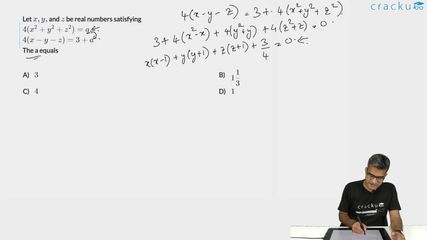Sign in
Please select an account to continue using cracku.in
↓ →
Let $$x, y,$$ and $$z$$ be real numbers satisfying
$$4(x^{2}+y^{2}+z^{2})=a,$$
$$4(x-y-z)=3+a$$
The a equals
We have two equations,
$$4(x^{2}+y^{2}+z^{2}) = a$$ ---(1)
$$4(x - y - z) = 3 + a$$ ---(2)
Substituting the value of a from equation 1 in equation 2, we get,
$$4\left(x\ -\ y\ -\ z\right)\ =\ 3\ +\ 4(x^2\ +\ y^2\ +\ z^2)$$
$$\ 3\ +\ 4(x^2\ +\ y^2\ +\ z^2)\ -4\left(x\ -\ y\ -\ z\right)\ =\ 0$$
$$\ 3\ +\ 4x^2\ +\ 4y^2\ +\ 4z^2\ -4x\ \ +\ 4y\ +\ 4z\ =\ 0$$
It can be written as,
$$4x^2\ -4x\ +\ 1+\ 4y^2\ +\ 4y\ +\ 1\ +\ 4z^2\ +\ 4z\ +\ 1\ =\ 0$$
$$\left(2x\ -\ 1\right)^2\ +\ \left(2y\ +\ 1\right)^2\ +\ \left(2z\ +\ 1\right)^2\ \ =0$$
We know that if the sum of the squares of terms is 0, then all the terms must be equal to 0
2x - 1 = 0
x = $$\dfrac{1}{2}$$
2y + 1 = 0
y = $$-\dfrac{1}{2}$$
2z + 1 = 0
z = $$-\dfrac{1}{2}$$
Substituting the values in equation 2, we get,
$$4\left(\dfrac{1}{2}\ -\ \left(-\dfrac{1}{2}\right)\ -\ \left(-\dfrac{1}{2}\right)\right)\ =\ 3\ +\ a$$
$$4\left(\dfrac{3}{2}\right)\ =\ 3\ +\ a$$
$$6\ =\ 3\ +\ a$$
$$\ a\ =\ 3$$
Therefore, the correct answer is option A.

Click on the Email ☝️ to Watch the Video Solution
Create a FREE account and get:
Educational materials for CAT preparation